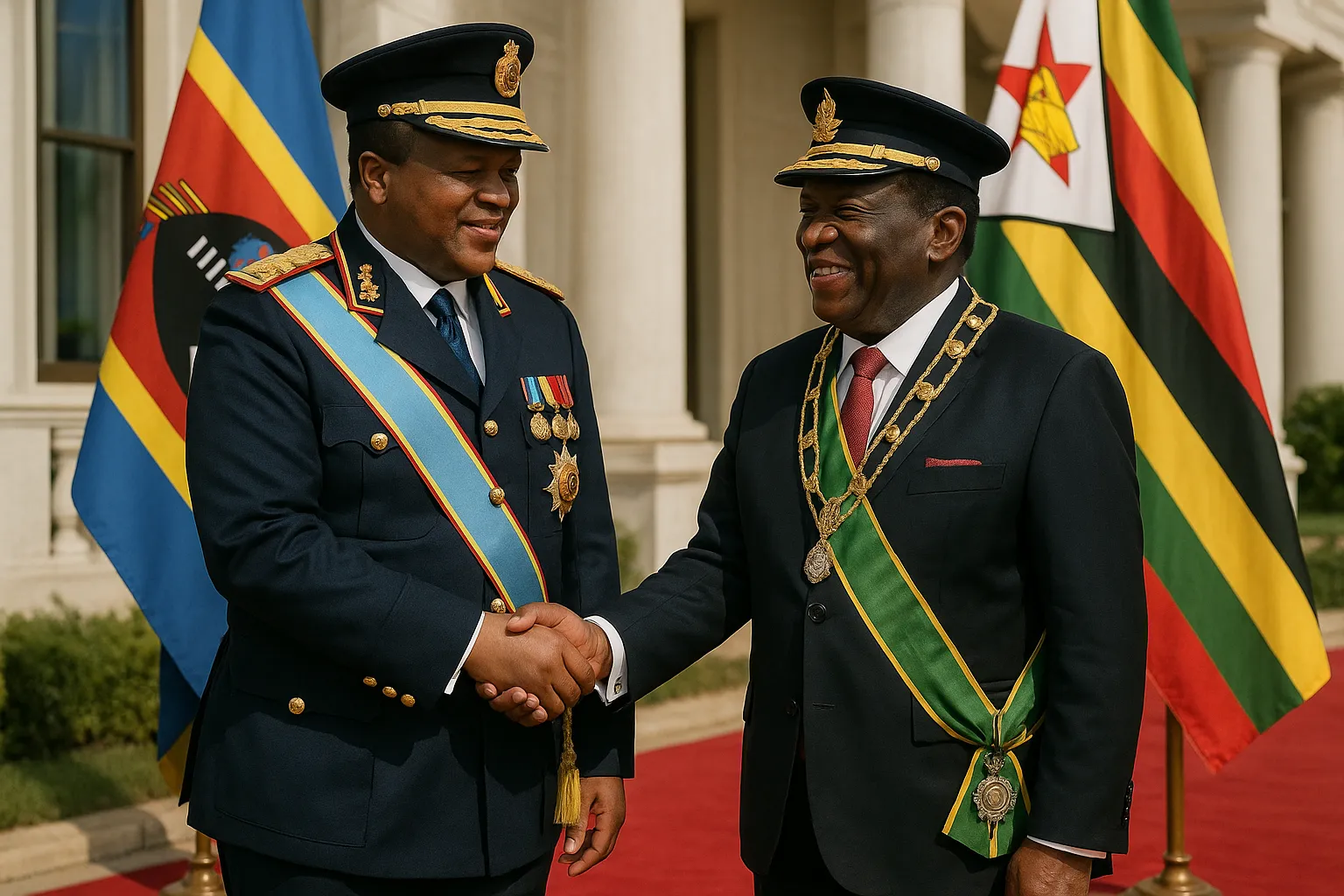Tell me what happened today 09/05/2025: “eswatini” and write it in news format in English.

use rules:
- Structure and style of presentation News texts should be organized according to the “inverted pyramid” principle: Lead: a brief introductory paragraph (1-2 sentences, 25-30 words) that reveals the most important 3-4 elements of the 5 W’s (What? Where? Who? When? Why? and How?). Nut Graf: the second paragraph, explaining the essence of the material and justifying its relevance. Main part: adds details in descending order of importance, allowing the text to be easily “shortened” from the end. At the same time: Active constructions and strong verbs are used; passive voice is best avoided. The language is concise and understandable, without unnecessary adjectives and bureaucratic language. Paragraphs are short (1-3 sentences) for better readability.
- Headline and visual presentation Headline: short (up to 100 characters), concise, with a strong verb, without excessive articles and tense forms. Subheadings and bullet points: help structure the text and make it easier to scan when reading online.
The result is displayed as an article ready for publication.
Based on the search results from September 5, 2025, here’s what happened in Eswatini that day, written in news format:
Eswatini Hosts Zimbabwe’s President as Key Developments Unfold
Zimbabwean President Emmerson Mnangagwa arrived in Eswatini for a state visit, while the country marked major health and policy milestones.
King Mswati III welcomed President Mnangagwa to the Kingdom of Eswatini for a two-day state visit coinciding with the country’s Independence Day celebrations. The Zimbabwean leader was received at King Mswati III International Airport and attended a state banquet hosted by the Eswatini monarch.
President Mnangagwa’s visit includes participation in the ongoing Eswatini International Trade Fair (EITF) 2025 and the traditional Umhlanga Reed Dance celebrations. The diplomatic gathering represents strengthening ties between the two Southern African nations as they collaborate on trade and cultural exchanges.
Health System Gains International Recognition
The World Health Organization (WHO) praised Eswatini’s government for prioritizing citizen welfare through comprehensive health reforms. The recognition comes as the country continues implementing its National Health Sector Strategic Plan 2024-2028, which has shown measurable improvements in maternal mortality rates and vaccination coverage.
Health officials highlighted the country’s progress in reducing institutional maternal mortality from 140 to 75 per 100,000 births in 2024, while HPV vaccination reached 74% of targeted girls. The WHO commended Eswatini’s “bold step towards holistic correctional health reform” as part of broader systemic improvements.
UNDP Approves Development Framework
The United Nations Development Programme (UNDP) approved Eswatini’s Country Program Document for 2026-2030, enabling implementation of projects aligned with Sustainable Development Goals. This approval represents a significant milestone in the country’s development planning and international cooperation efforts.
The new framework builds on the previous 2021-2025 program and focuses on strengthening governance, economic transformation, and social development initiatives across the kingdom.
Government Moves Against Hazardous Pesticides
Eswatini’s government announced plans to ban Master 900 and other hazardous pesticides following concerns about their misuse in suicide cases. The Ministry of Agriculture confirmed that access to these chemicals will now require special permits, with strict controls on distribution and usage.
The restriction follows a pattern of increased regulation after reports of pesticide abuse, particularly Master 900’s role in suicide incidents across the country. Alternative, less harmful pesticides are being developed to maintain agricultural effectiveness while protecting public safety.
Parliamentary Delegation Continues Regional Exchange
An Eswatini parliamentary delegation led by Deputy Speaker Marwick Khumalo concluded their visit to KwaZulu-Natal Legislature as part of Commonwealth Parliamentary Association activities. The exchange focused on knowledge sharing and strengthening parliamentary practices between the two regions.
The delegation attended legislative sessions and visited the Nelson Mandela Capture Site in Howick, with their two-day program concluding at the Legislature’s wellness event at Harry Gwala Stadium.
These developments underscore Eswatini’s active engagement in regional diplomacy, health system strengthening, and policy reforms as the country prepares for its Independence Day celebrations on September 6, 2025.
Categories
Autos and vehicles Beauty and fashion Business and finance Climate Entertainment Food and drink Games Health Hobbies and leisure Jobs and education Law and government Other Politics Science Shopping Sports Technology Travel and transportationRecent Posts
Tags
Archives
08/19/2025 (3) 08/20/2025 (40) 08/21/2025 (27) 08/22/2025 (22) 08/23/2025 (4) 08/24/2025 (21) 08/25/2025 (30) 08/26/2025 (24) 08/27/2025 (29) 08/28/2025 (16) 08/29/2025 (9) 08/30/2025 (13) 08/31/2025 (17) 09/01/2025 (167) 09/02/2025 (124) 09/03/2025 (149) 09/04/2025 (112) 09/05/2025 (72) 09/06/2025 (169) 09/07/2025 (162) 09/08/2025 (150) 09/09/2025 (176) 09/10/2025 (194) 09/11/2025 (194) 09/12/2025 (186) 09/13/2025 (207) 09/14/2025 (159) 09/15/2025 (175) 09/16/2025 (198) 09/17/2025 (196) 09/18/2025 (196) 09/19/2025 (207) 09/20/2025 (129) 09/21/2025 (4)